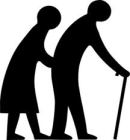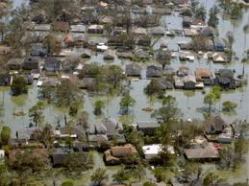I’m not sure what I expected to see that day, driving along I-10 through Louisiana. Devastation was everywhere. Six months had passed since Hurricane Katrina. Minutes ahead lay an in-your-face encounter. It would be sad, and gratifying.
The exit from I-10 leading to the state’s New Orleans information center was lined on both sides with cars. The parking lot was full. A steady parade of people slowly made its way up the sidewalk as I slipped my car into a stall just vacated by another. My lucky day.
I paused to reflect on what I’d just seen along the Interstate. Stark contracts were everywhere. Driving up a hill towards New Orleans I saw a massive billboard doubled over. A few seconds farther, all visible evidence of the horrific storm was absent. Then I came upon what seemed like a farm field framed by trees. I was wrong. The ‘field’, some 500 yards wide, had been part of a forest. The trees had been sheered off as if with a giant chain saw. At one edge of the clearing, a huge log rested horizontally on the top of another lone tree, evidently unharmed. Before Katrina, that log had been a tree. Now, its top was ripped off. At the other end of the log, remnants of tree roots were still attached.
At the information center, it was the wheelchair that first drew my attention to them. Four people were on the sidewalk in front of trailers that served as the temporary visitor facility. Two of the four were elderly, her in a wheelchair pushed by a younger man in his mid-40s. The elderly man walked slowly along side, leaning heavily on a cane in his left hand. Behind him was a woman in her mid-40s. I guessed the woman in the wheelchair was the young man’s mother, the younger woman his wife.
A scurry of activity diverted my attention. More staff had arrived to open additional reception desks. Queue discipline shattered as people scrambled to get served. When the commotion settled, I was behind the four people I’d seen on the sidewalk. They and I were minutes from reaching an information wicket. My lucky day.
The elderly gentleman kept bending down, painfully it seemed, to check on his elderly wife. She was slumped down in the wheelchair, head bowed, a blanket tucked closely around her knees.
“How can I help you folks?” said a cheerful middle-aged woman behind the desk, smiling warmly.
“We’s git to be home,” the elderly man replied. “But a trooper done tol’ us ‘no way.’ Sez ya’ll gotta stay outta da city. He dun sent us here. Sez we gotta get some kina permit.”
The woman behind the desk looked at them kindly.
“Where you among the people evacuated?”
“Yes, ma’am,” the man said. “They done ship us ova ta Mobile way. Bin dere fer weeks. We bin hearin’ people were gitten to go back home. I done need to check on our house, ya see.”
“Yes, sir, I understand,” the woman said. “Some people are being allowed back into the city . . . but only in a few areas. Where do you live?”
The man handed her a card. It was some kind of picture ID.
The woman copied the details into a computer. She frowned. A look of sorrow crossed her face.
“I’m very sorry sir,” she said. “But that neighborhood is still flooded . . . still closed.”
“But we dun gotta git home!” the elderly man insisted.
“I am terribly sorry, sir,” the woman said. “That neighborhood is still flooded. I can’t give you a permit to go there.”
“We jist gotta git back home,” he pleaded, his eyes filling with tears. “I dun built that house for my family jest before we wuz married . . . that’s bin 70 year, now. It’s all we got, you know. My wife here’s very poorly . . . she’s dying. . . just a few weeks, the doctors done told her . . . want’s to die at home. Please! Can you help?”
“I understand,” she replied, glancing at the elderly woman. A tear formed in the corner of her eye. A young man, he appeared to be a college student on work-study, came up behind her and whispered in her ear.
Her face brightened.
“Let me check your address again,” she said. “Some streets in that neighborhood are on higher ground. I’ve just been told that a few were opened this morning.
“Yes,” the woman said. “Here it is! Your street is open! Oh, isn’t that wonderful!”
“Oh, I do thank ya, miss!” the elderly man said with a deep sigh, putting one hand gently on his wife’s shoulder, wiping his eyes with the other, cane over his forearm.
“We’s dun goin’ home, my love!” he said gently. “You and me, we’s goin’ home.”
It was their lucky day.
#
“The Hurricane” is copyright 2013 By James Osborne All Rights Reserved
#
“The Hurricane” is based on events observed by the author.



What a great story about the heartache of such a horrible tragedy. I have family in New Orleans. Some rebuilt and some moved on, but everyone’s lives were forever changed after Katrina! All the best to you! Again, Great story!
LikeLike
Another great blog story by James Osborne. My husband and I have a nephew and family living in New Orleans who evacuated their beautiful home just hours before Katrina struck.They sent us photos of their house weeks after the storm, when thy were finally allowed back to take a look. Antique furniture inherited from his great grandmother – gone. Wall and floors – totally demolished. But the photo that got to me most was the one of their front door, which had a large red X painted within an even larger red circle – code for: “No dead bodies found here.” They never moved back into that house.
LikeLike
Heart-rending and heart-warming.
LikeLike